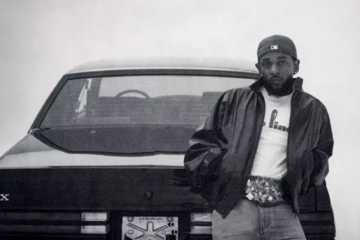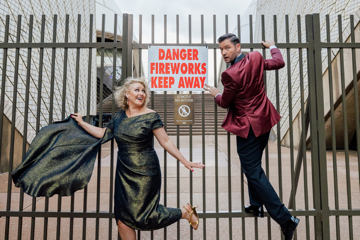Vale Leonard Cohen: Poet, Ladies' Man & A Master Of Coaxing Beauty From Dysfunction
"You can almost imagine the smiling Cohen behind the microphone, appearing ageless in a perfect suit, daring what/whoever the Great Maker is come and get him."

Leonard Cohen was the type of musician who told both extremely specific but also extremely relatable stories.
This struck me most when he wrote women’s stories. The title track to 1977’s Death Of A Ladies Man somehow captures what it’s like to be disappointed as both a man and a woman — well, I imagine what the first is like, and somehow, he’s imagined the second to near perfection. It’s all there in the first line — “The man she wanted all her life was hanging by a thread/ ‘I never even knew how much I wanted you,’ she said.” Right there — both sides aiming for perfection, and ultimate destruction. Add to it the weird and wonderful Phil Spector production and co-write, and well, it’s magic.
Cohen specialised in writing about strange and often beautifully dysfunctional relationships. 1971’s Songs Of Love And Hate said it right there on the tin — although these weren’t all just romantic relationships. On that album, Joan Of Arc tells the story of the relationship between the famous crusader and the flames that killed her. Telling the story of Joan’s struggle, then acceptance of her brutal fate, Cohen punctuates the story with a chorus of whimsical “la-la-la”s, supported by perfectly placed female backing singers. Towards the end, a solo horn-like sound covers the bass line — a darkly funny, but also ambiguous, sonic salute. For the last chorus it moves to the melody — just to seal the deal.
Don't miss a beat with our FREE daily newsletter
Like most kids who came of age chronologically and musically in the 1990s, I first came to Leonard Cohen via Jeff Buckley. Call it sacrilege if you need to, but a '90s teenager didn’t have much choice at the time. Music on the internet was beyond our imaginations, as was willingly listening to our parents’ music. Nuanced, slowburn and often quite dark (and darkly funny), at the time I didn’t want music from music someone else’s generation. But, somehow, it drew me. The song dares to speak to those who “don’t really care for music” while also rewarding the nerds with “the fourth, the fifth, the minor fall, the major lift.” All wrapped up with a “Hallelujah” — so balls-out religious that you’d think it would never have a place in the devil’s playground that is popular music. It remains the song that let Cohen bridge genres and generations, and overexposure is hardly his fault.
Perhaps my favourite song of Cohen’s is Chelsea Hotel #2 from 1974’s New Skin For The Old Ceremony. The song tells the story of that one time, when living in the famous New York establishment, Cohen got a blowjob from Janis Joplin. As you do. The ‘cute’ lines like “You told me again you preferred handsome men/But for me you’d make an exception” are funny, and they build to the crushing account of their brief relationship — what he names as Joplin’s account; “We are ugly, but we have the music”. The song’s verses are stoic, but the chorus brutal in its plain statement of Joplin’s demise — “You got away, didn’t you, babe/ you just turned your back to the crowd”. As I read more about her life years after first hearing the song, I can to find this line almost hateful in its directness. But Joplin’s determination comes through in the chorus as Cohen sings, “I never once heard you say I need you/ I don’t need you/ and all of that jiving around”. She didn’t need him, but he spelt out her strength and vulnerability so eloquently.
Just last month, Cohen released what would be his last album, You Want It Darker. Released in the extremely rare “written and performed by someone over 80” category of popular music, mortality was a dominant theme. Cohen’s deep voice delivered a version of the devil’s gospel as he ushered the album and its title track in with deep chanting and keys that he sounds like he stole from their usual Sunday spot. The mostly spoken lyric climaxes with, “I’m ready, my Lord”. You can almost imagine the smiling Cohen behind the microphone, appearing ageless in a perfect suit, daring what/whoever the Great Maker is come and get him.
Like Bowie’s Blackstar and Johnny Cash’s America series, we now know that You Want It Darker was Cohen having one last victory lap. The ladies' man, as he will always be to me, again spoke for our side in a way that perhaps only an outsider really can. One of his last songs of love, hate and a relationship appears on this album: Treaty. After the wicked title track, it appears, and he sings, “I wish there was a treaty between your love and mine”; “I’m so sorry for that ghost I made you be/ only one of us was real, and that was me.” Here, the music is surprisingly upbeat, disconcerting almost.
As if to correct himself, the song appears again as the album’s very last track (and now, we assume, his very last recorded statement). The words are replaced with weepy strings that sigh the song’s melody for the most of the song. Just when it seems he’s left the building, Cohen’s voice appears to sing one last verse — “I wish there was a treaty we could sign … were broken then, but now we’re borderline”. Now that Cohen’s crossed the ultimate border, he’s left a treaty for us to sign — to keep telling wonderful, complex, sometimes brutally honest musical stories.







